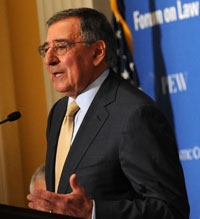National Security and Business Leaders: Law of the Sea is ‘Vital' to U.S. National Interests
U.S. national security and business leaders—including Secretary of Defense Leon Panetta and Gen. Martin Dempsey, Chairman of the Joint Chiefs of Staff—today called the Law of the Sea Convention essential to protect American security and economic interests, guarantee the global mobility of U.S. armed forces, and extend U.S. sovereignty.
“Frankly, this is not even a close call - the Law of the Sea Convention is supported by major U.S. industries, the Chamber of Commerce, our energy, shipbuilding, shipping, and communications companies, and environmental organizations along with past and present Republican and Democratic administrations and the entire national security leadership,” said Secretary Panetta. "Not since we acquired the lands of the American West and Alaska have we had such an opportunity to expand U.S. sovereignty."
Secretary Panetta and Gen. Dempsey spoke to a gathering of U.S. national security and business leaders in Washington, D.C., convened by The Pew Charitable Trusts and the Atlantic Council. Numerous high-ranking former U.S. military officials and a diverse array of business representatives also participated in the forum to discuss the national security and economic merits of the treaty.
|
|
The Honorable Leon E. Panetta, | General Martin E. Dempsey, |
“The U.S. Chamber of Commerce strongly supports the Law of the Sea Treaty because it would provide clear legal rights and protections to American businesses to transit, lay undersea cables, and take advantage of the vast natural resources in and under the oceans off the U.S. coasts and around the world,” said Bruce Josten, executive vice president for Government Affairs at the U.S. Chamber of Commerce.
|
|
R. Bruce Josten, | Martin J. Durbin, |
“The United States stands with Turkey as the only NATO members that have not ratified Law of the Sea, a U.S.-initiated treaty that protects American interests off U.S. shores and around the world,” said Chuck Hagel, a former senator from Nebraska and now chairman of the Atlantic Council. “Senate ratification this year would allow America to take its rightful place and enjoy the benefits and protections of this important treaty.”
The benefits of U.S. participation in the treaty include:
- A Stronger Economy: For example, the treaty would grant the United States worldwide commercial access to undersea communications cables that keep America connected across the globe.
- Enhanced National Security: For example, the U.S. military would be in the strongest possible position to protect our legal rights to move through and over the world's oceans (via ships and aircraft), and ensure unimpeded access to critical maritime transit routes. This includes traveling through geopolitically important choke points such as the Strait of Hormuz.
- Extension of U.S. Sovereignty: The treaty would strengthen America's claim to the full outer continental shelf. In the case of Alaska, this would extend U.S. sovereignty 600 miles offshore, instead of the current 200-mile limit.
“Vital American security and economic interests have, and will continue to, come under increasing threat,” said Senator John Warner, former Secretary of the Navy and former Chairman of the Armed Services Committee, who is a senior adviser for national security at Pew. “The United States can dramatically expand its sovereign rights by becoming party to this treaty.”
All living former U.S. Presidents and Secretaries of State, the current members of the Joint Chiefs of Staff, and dozens of current and former Army, Marine, and Air Force generals and Navy and Coast Guard admirals have endorsed the Law of the Sea Treaty.
About The Pew Charitable Trusts
The Pew Charitable Trusts is driven by the power of knowledge to solve today's most challenging problems. Pew applies a rigorous, analytical approach to improve public policy, inform the public, and stimulate civic life.
About the Atlantic Council
The Atlantic Council is a nonpartisan organization that promotes constructive U.S. leadership and engagement in international affairs based on the central role of the Atlantic community in meeting today's global challenges.










